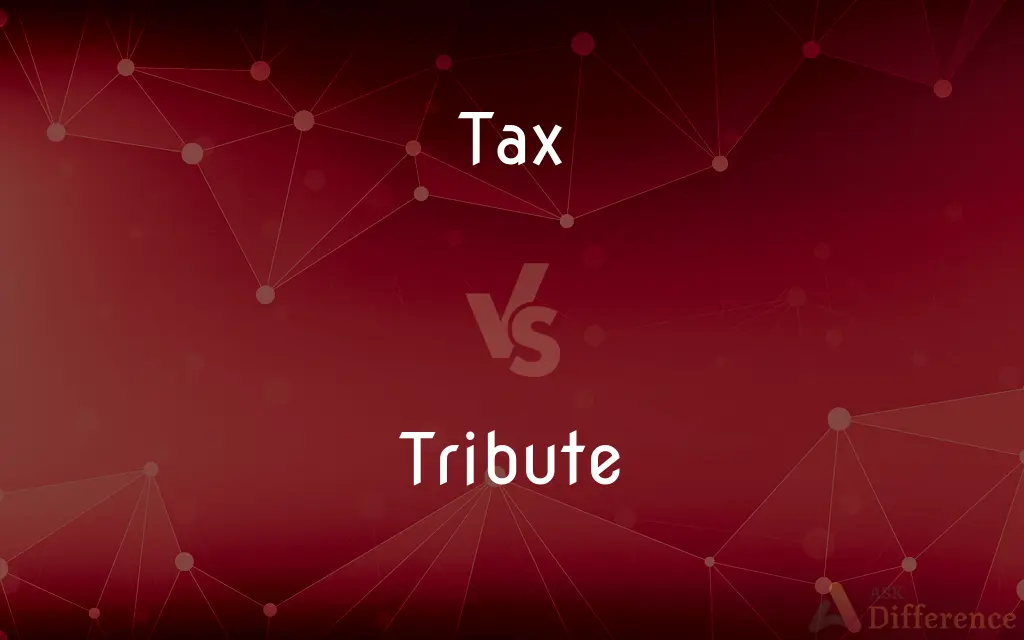Tax vs. Tribute — What's the Difference?
Edited by Tayyaba Rehman — By Maham Liaqat — Updated on March 19, 2024
Tax is a mandatory financial charge by a government, while tribute is a payment by one state or ruler to another, often as a sign of submission.

Difference Between Tax and Tribute
Table of Contents
ADVERTISEMENT
Key Differences
Taxes are compulsory payments made by individuals and corporations to fund public services and government operations. Whereas tributes were historically voluntary or coerced payments from one nation or people to a more powerful entity, often in exchange for protection or as a sign of submission.
The concept of tax is tied to modern state governance and is a key element in the social contract, implying citizens' obligations towards their government in return for benefits and services. On the other hand, tribute often harks back to ancient or medieval times when it was a form of fealty or allegiance between different powers, without implying mutual obligations beyond peace or protection.
Taxes are calculated based on laws and regulations, which can include income levels, property values, or sales transactions, and are subject to change through legislative processes. In contrast, tributes were typically negotiated or imposed by conquerors, and their amount, form, and frequency could vary significantly based on the power dynamics between the parties involved.
In modern contexts, taxes serve various purposes, including funding government operations, public infrastructure, and social services, aiming at redistributing wealth and ensuring societal welfare. Tribute, while not common in contemporary international relations, is more closely related to historical practices of diplomacy and conquest, reflecting hierarchical relationships rather than mutual societal obligations.
Despite these differences, both taxes and tributes represent transfers of wealth that can influence economic and political relationships. However, taxes are characterized by their role in financing the state and providing for the common good, while tributes were more about power, domination, and often the prevention of aggression.
ADVERTISEMENT
Comparison Chart
Nature
Mandatory financial charge by a government
Payment by one state or ruler to another
Purpose
Fund public services and government operations
Show submission or receive protection
Basis
Laws and regulations
Power dynamics, negotiation, or coercion
Period
Ongoing and regular
Historical, often during specific periods or events
Calculation
Based on income, property, sales, etc.
Negotiated or imposed
Societal Role
Redistribution of wealth, finance public services
Power dynamics, diplomacy, conquest
Legal Framework
Determined by legislation
Determined by agreements or conquest
Modern Usage
Fundamental to modern state governance
Rare, mostly historical context
Compare with Definitions
Tax
Adjusted according to policies to influence economic conditions.
The new tax law aims to stimulate economic growth.
Tribute
Served as a tool for diplomacy and maintaining peace.
Paying tribute was a strategy to maintain peace with neighboring empires.
Tax
A compulsory contribution to state revenue.
The government increased the tax on luxury goods.
Tribute
Historically, a sign of submission or respect.
Tributes were sent to the emperor to show loyalty.
Tax
Collected on goods and services at the point of sale.
Sales tax is added to the price of every item purchased.
Tribute
Often established through negotiation or conquest.
After the war, the terms of tribute were harsh and demanding.
Tax
Levied by the government on workers' income and business profits.
Income tax is deducted from my monthly paycheck.
Tribute
Can be in the form of money, goods, or services.
The tribute included gold, silver, and precious stones.
Tax
Used to fund public services like education and healthcare.
Our taxes help pay for public schools and hospitals.
Tribute
A payment made periodically by one state to another, especially as a sign of dependence.
The conquered city paid tribute to avoid further aggression.
Tax
A tax is a compulsory financial charge or some other type of levy imposed on a taxpayer (an individual or legal entity) by a governmental organization in order to fund government spending and various public expenditures. A failure to pay, along with evasion of or resistance to taxation, is punishable by law.
Tribute
A tribute () (from Latin tributum, contribution) is wealth, often in kind, that a party gives to another as a sign of respect or, as was often the case in historical contexts, of submission or allegiance. Various ancient states exacted tribute from the rulers of land which the state conquered or otherwise threatened to conquer.
Tax
A compulsory contribution to state revenue, levied by the government on workers' income and business profits, or added to the cost of some goods, services, and transactions
A tax bill
Higher taxes will dampen consumer spending
A tax on fuel
Tax cuts
They will have to pay tax on interest earned by savings
Tribute
An act, statement, or gift that is intended to show gratitude, respect, or admiration
A symposium organized to pay tribute to Darwin
The video is a tribute to the musicals of the 40s
Tax
A strain or heavy demand
A heavy tax on the reader's attention
Tribute
Payment made periodically by one state or ruler to another, especially as a sign of dependence
The king had at his disposal plunder and tribute amassed through warfare
Tax
Impose a tax on (someone or something)
The income will be taxed at the top rate
Tribute
A proportion of ore or its equivalent, paid to a miner for his work, or to the owner or lessor of a mine.
Tax
Make heavy demands on (someone's powers or resources)
She knew that the ordeal to come must tax all her strength
Tribute
A gift, payment, declaration, or other acknowledgment of gratitude, respect, or admiration
Put up a plaque as a tribute to his generosity.
Tax
Confront (someone) with a fault or wrongdoing
Why are you taxing me with these preposterous allegations?
Tribute
Evidence attesting to some praiseworthy quality or characteristic
Winning the scholarship was a tribute to her hard work.
Tax
Examine and assess (the costs of a case)
An officer taxing a bill of costs
Tribute
A payment in money or other valuables made by one ruler or nation to another in acknowledgment of submission or as the price of protection or security.
Tax
A contribution for the support of a government required of persons, groups, or businesses within the domain of that government.
Tribute
A tax imposed for such payment.
Tax
A fee or dues levied on the members of an organization to meet its expenses.
Tribute
Any payment exacted for protection.
Tax
A burdensome or excessive demand; a strain.
Tribute
A payment or tax given by a feudal vassal to an overlord.
Tax
To place a tax on (income, property, or goods).
Tribute
The obligation to make such a payment.
Tax
To exact a tax from
Taxed the people.
Tribute
An acknowledgment of gratitude, respect or admiration; an accompanying gift.
Please accept this as a tribute of our thanks.
Tax
(Law) To assess (court costs, for example).
Tribute
An homage made in a body of work to another work or creator.
Tax
To make difficult or excessive demands upon
A boss who taxed everyone's patience.
Tribute
A payment made by one nation to another in submission.
The Ancient Romans made their conquered countries pay tribute.
Tax
To accuse; confront
Taxed him with ingratitude.
Tribute
Extortion; protection money.
Tax
To hold accountable
The contractor was taxed with the mistake of the subcontractor.
Tribute
A payment made by a feudal vassal to his lord.
Tax
Money paid to the government other than for transaction-specific goods and services.
Tribute
(mining) A certain proportion of the mined ore, or of its value, given to the miner as payment.
Tax
A burdensome demand.
A heavy tax on time or health
Tribute
(transitive) To pay as tribute.
Tax
A task exacted from one who is under control; a contribution or service, the rendering of which is imposed upon a subject.
Tribute
An annual or stated sum of money or other valuable thing, paid by one ruler or nation to another, either as an acknowledgment of submission, or as the price of peace and protection, or by virtue of some treaty; as, the Romans made their conquered countries pay tribute.
Millions for defense, but not one cent for tribute.
Tax
(obsolete) charge; censure
Tribute
A personal contribution, as of money, praise, service, etc., made in token of services rendered, or as that which is due or deserved; as, a tribute of affection.
Implores the passing tribute of a sigh.
Tax
(transitive) To impose and collect a tax from (a person or company).
Some think to tax the wealthy is the fairest.
Tribute
A certain proportion of the ore raised, or of its value, given to the miner as his recompense.
Tax
(transitive) To impose and collect a tax on (something).
Some think to tax wealth is destructive of a private sector.
Tribute
To pay as tribute.
Tax
(transitive) To make excessive demands on.
Do not tax my patience.
Tribute
Something given or done as an expression of esteem
Tax
(transitive) To accuse.
Tribute
Payment by one nation for protection by another
Tax
(transitive) To examine accounts in order to allow or disallow items.
Tribute
Payment extorted by gangsters on threat of violence;
Every store in the neighborhood had to pay him protection
Tax
A charge, especially a pecuniary burden which is imposed by authority.
Tax
A charge or burden laid upon persons or property for the support of a government.
A farmer of taxes is, of all creditors, proverbially the most rapacious.
Tax
A task exacted from one who is under control; a contribution or service, the rendering of which is imposed upon a subject.
Tax
Especially, the sum laid upon specific things, as upon polls, lands, houses, income, etc.; as, a land tax; a window tax; a tax on carriages, and the like.
Tax
A disagreeable or burdensome duty or charge; as, a heavy tax on time or health.
Tax
A sum imposed or levied upon the members of a society to defray its expenses.
Tax
Charge; censure.
Tax
A lesson to be learned; a task.
Tax
To subject to the payment of a tax or taxes; to impose a tax upon; to lay a burden upon; especially, to exact money from for the support of government.
We are more heavily taxed by our idleness, pride, and folly than we are taxed by government.
Tax
To assess, fix, or determine judicially, the amount of; as, to tax the cost of an action in court.
Tax
To charge; to accuse; also, to censure; - often followed by with, rarely by of before an indirect object; as, to tax a man with pride.
I tax you, you elements, with unkindness.
Men's virtues I have commended as freely as I have taxed their crimes.
Fear not now that men should tax thine honor.
Tax
Charge against a citizen's person or property or activity for the support of government
Tax
Levy a tax on;
The State taxes alcohol heavily
Clothing is not taxed in our state
Tax
Set or determine the amount of (a payment such as a fine)
Tax
Use to the limit;
You are taxing my patience
Tax
Make a charge against or accuse;
They taxed him failure to appear in court
Common Curiosities
Can taxes be negotiated?
Taxes are not typically negotiable as they are determined by laws and regulations set by governing bodies.
Are there modern equivalents to tribute?
While not common, some international aid or protection payments might be viewed as contemporary forms of tribute, though they are generally part of formal agreements rather than unilateral demands for submission.
Did tribute ever benefit the paying party?
Yes, paying tribute could benefit the payer by securing peace, protection, or favorable relations with a more powerful entity.
How is tax revenue used by governments?
Tax revenue is used to finance various public services, including healthcare, education, infrastructure development, and welfare programs.
How were tributes used historically?
Tributes were used as payments to more powerful entities, often in exchange for protection, as a sign of submission, or to maintain peace.
Was tribute always paid in money?
No, tribute could be paid in various forms, including money, goods, services, or even labor, depending on the agreement between the entities involved.
Did all societies pay tribute?
Many societies throughout history have paid tribute at some point, especially those that were less powerful or were trying to maintain peaceful relations with neighboring states or empires.
What determined the amount of tribute paid?
The amount of tribute was often determined by negotiations, the relative power of the parties involved, or through imposition by the more powerful entity.
Do taxes influence economic behavior?
Yes, taxes can significantly influence economic behavior, including spending, saving, and investment decisions, through incentives or disincentives.
What happens if taxes are not paid?
Failure to pay taxes can result in penalties, legal action, and even imprisonment, depending on the jurisdiction and the severity of the evasion.
How did ancient states enforce the payment of tribute?
Ancient states enforced tribute payment through military power, diplomatic pressure, or threats of aggression.
What is the main purpose of taxes?
Taxes fund government operations, public infrastructure, and social services, aiming at societal welfare and redistribution of wealth.
Is paying taxes considered a civic duty?
Yes, paying taxes is considered a civic duty, essential for the functioning of the government and the provision of public goods and services.
Can tax rates change?
Tax rates can and do change, subject to the legislative processes of the government to reflect economic policies and societal needs.
Are there exceptions to who must pay taxes?
Yes, there are exceptions and exemptions in tax systems, including for individuals below a certain income level, charitable organizations, and certain types of income or transactions.
Share Your Discovery

Previous Comparison
Retrograde vs. Antegrade
Next Comparison
Chest vs. TrunkAuthor Spotlight
Written by
Maham LiaqatEdited by
Tayyaba RehmanTayyaba Rehman is a distinguished writer, currently serving as a primary contributor to askdifference.com. As a researcher in semantics and etymology, Tayyaba's passion for the complexity of languages and their distinctions has found a perfect home on the platform. Tayyaba delves into the intricacies of language, distinguishing between commonly confused words and phrases, thereby providing clarity for readers worldwide.














































